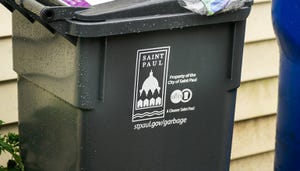Agreement Over Lee County Landfill Sparks Legal Debate
This month we examine a county’s commitment, which, although reconfirmed periodically, turned out years later to be inconvenient. Local officials unsuccessfully tried to backtrack on it.
January 6, 2023

“The promise given was a necessity of the past: the word broken is a necessity of the present.” Attributed to Niccolò Machiavelli, a 16th Century precursor of today’s political strategist, the remark denotes that someone in power is free to make, keep or break a pledge as the circumstances require.
This month we examine a county’s commitment, which, although reconfirmed periodically, turned out years later to be inconvenient. Local officials unsuccessfully tried to backtrack on it.
Named for “Lighthorse Harry” Lee, an officer in the Revolutionary War, Lee County was created as an Illinois governmental unit in 1839. Situated about 100 miles west of Chicago, the county’s administrative center is the city of Dixon where former President Ronald Reagan grew up and attended high school.
In August 1993, the county board adopted a solid waste management plan (Plan) under the state Solid Waste Planning and Recycling Act (SWPRA). These plans must be updated every five years. Not quite a year later, the county entered into a solid waste management agreement (Agreement) with Republic Services, Inc., and its subsidiary, Lee County Landfill, Inc. (LCL) whereby the two companies jointly consented to operate a landfill within the county in exchange for, among other things, the county’s commitment "to amend its . . . Plan by designating the Lee County Landfill as its regional waste disposal facility." Thereafter, the county dutifully modified the Plan to provide that it would utilize the existing sited landfill capacity within its boundaries as its long-term disposal option, acknowledging its agreement with the companies "to continue operation of the Lee County Landfill into the foreseeable future."
The county adopted, in October 1998, its first five-year update of the Plan, which restated that it would "rely on the Lee County Landfill for its long-term disposal capacity pursuant to its
. . . Agreement with [Republic and LCL]." The update also expressed the intention that no new landfills be sited or expanded in Lee County for the next five years.
Contemplating the filing of an application for the expansion of the landfill, Republic and LCL conferred with county representatives and, in October 2002, signed an amendment to the Agreement. The companies committed to (a) providing "long-term, environmentally sound landfill disposal capacity for [county] residents and commercial, institutional, and industrial establishments" and (b) paying the county a fee for each ton of waste handled at the landfill. For its part, the county agreed to amend the Plan "to designate the Lee County Landfill as the sole landfill to be permitted in Lee County, so long as [LCL] is . . . operating the Lee County Landfill . . . and is in compliance with the Agreement (as amended) and the . . . Plan."
In November 2003, the county adopted yet another five-year update to the Plan, which expressly acknowledged the 2002 amendment to the Agreement. This latest revision had a board-approved list of recommendations that included the following:
"The Lee County Landfill as it is currently permitted and as it is anticipated to be
expanded, shall be designated as the sole landfill to be permitted anywhere within
the borders of Lee County. This sole designation is contingent upon the Lee
County Landfill and its expansion remaining open and operating, and remaining
in compliance with the . . . Agreement, as amended."
The parties adopted a second amendment to the Agreement, in November 2008, after the county sought assurances from the companies and investments in the landfill to safeguard the county's future solid waste disposal needs. In exchange for these commitments, the county reaffirmed “its agreement, commitment, and determination that the [Lee County] Landfill will be the only landfill to be permitted in Lee County." Later that same month, the county adopted its 15-year Plan update, which, in part, reiterated the landfill's designation as the "sole landfill.”
A third, and final, amendment to the Agreement, in March 2012, "recognize[d] the historical and future capability of the [Lee County] Landfill and [the companies] to provide for the solid waste disposal needs of [Lee] County." As they had done in the second amendment to the Agreement, the companies again promised "to ensure the solid waste disposal needs of [Lee] County are met in the future" while the county agreed "to reaffirm its agreement, commitment, and determination that the [Lee County] Landfill will be the only landfill to be permitted in Lee County."
In November 2013 the county board approved its 20-year update to the Plan. This version, however, had a glaring and ominous omission. Nowhere did it mention the county’s obligations under the amended Agreement nor did it designate the Lee County Landfill as the county’s one and only landfill. Its only reference was tepid; the county would "continue to rely on the . . . Lee County Landfill for disposal capacity for at least the next five years."
The situation got a lot clearer when, in June 2019, the now-enterprising board unveiled a 25-year updated Plan wherein the county would "position itself as a regional depository for waste generated in northern Illinois." To that end it provided that “[t]he Lee County Landfill shall no longer be designated as the sole landfill to be permitted within [Lee] County," and that the board "retain[ed] the right to site a second landfill in Lee County," despite the landfill's "projected . . . 49 years of remaining capacity."
What followed was, to say the least, an uneasy time for Republic and LCL. Finally, in November 2021, the county filed a complaint in Lee County Circuit Court, arguing that the companies’ stance on the Agreement – elevating it above the amended Plan – was wrong. As the county saw things, the Agreement “always deferred to the plan . . . concerning the designation of
the [Lee County] Landfill as the sole landfill in Lee County." The county sought a judgment declaring that it could consider siting a second landfill within its geographic boundaries and that the amended Agreement did not restrict its right to do so.
With no essential facts in dispute, the companies responded with a motion for summary judgment in their favor, asserting that the Agreement, as well as its amendments, limited the “[county’s] right to permit the operation of any landfill at and within its geographic boundaries
. . . allowing [companies] to commence and continue to operate the subject landfill as the 'sole' landfill within . . . [county’s] geographic boundaries."
In response, the county maintained that "any promise to designate the [Lee County] Landfill as the 'sole landfill' was . . . only for a limited amount of time." Supporting its argument, it claimed that the updates to the Plan "making the sole landfill designation . . . , by their express terms, were each for a limited time period of 5 years," and that under the Illinois Environmental Protection Act (Act) the language of the plan takes precedence over the terms of the Agreement. Thus, according to the county, the companies were not entitled to judgment in their favor because the Plan (a) had not designated their landfill as the "sole landfill" to be permitted in Lee County since 2013 and (b) had, since 2019, opened the door for a second landfill.
After considering arguments from both sides, Circuit Judge Clayton L. Lindsey signed a written order, in April 2022, granting the companies’ motion, noting there "ha[d] been no allegation that [the companies] are in breach of the Agreement or that the contract ha[d] been terminated." After examining the relevant provisions of the Act and SWPRA, Judge Lindsey determined that the county could rightfully “make the Lee County Landfill an exclusive landfill within [Lee] County . . . , even if such exclusive methods . . . have an anti-competitive effect."
Under his ruling, the county’s "absolute authority" under state law to decide how it disposes of solid waste is limited by the related contracts it has entered into. "While [the County] can certainly make a policy determination that a second landfill is necessary, this . . . authority does not give [it] the unfettered right to breach or terminate an existing contract,” he wrote. “The contract [the County] has entered [sic] with [the companies] . . . requires such landfill to be operated by [the companies]. The contract has not expired and there is no contention that Lee County Landfill is not continuing to be open and operating . . . in Lee County. * * * [The County] is certainly free to set its policy and determine that it should place itself in a position to accept waste from northern Illinois and Wisconsin. It can also reach the policy decision to site another landfill. However, it must do so within the contractual obligations it has entered into with the [companies]."
On appeal, the county reprised its arguments in the lower court: the Plan governs the Agreement and, therefore, the only promise made to the companies was to grant exclusive landfill status, but only until the next Plan update. These rationalizations fared no better before the three-judge appellate panel, which unanimously upheld the lower court order.
The appeals court looked at the big picture. Illinois law establishes a unified, state-wide program to restore, protect and enhance the quality of the environment. Within this system, county and municipal governments have appreciable control over new solid waste disposal sites within their boundaries. This authority includes developing and adopting a solid waste plan that must be updated every five years. Local governments also may provide “by . . . contract or other means that the methods of disposal of solid waste shall be the exclusive methods of disposal to be allowed within their respective jurisdictions."
“This is the action [County] took when it agreed to designate the Lee County Landfill as the ‘sole landfill’ to be permitted within Lee County, so long as it remained open and operating and in compliance with the Agreement,” said the justices. “However, aside from granting units of local government considerable discretion in how they manage solid waste and providing the relevant criteria for local siting approval, [no state statutes] contain a provision granting a county the right to unilaterally terminate an existing contract. * * *
“[County’s] contractual obligations regarding the Lee County Landfill's ‘sole landfill’ designation stem from the Agreement. * * * [T]he Agreement, at least as of the present time, has not expired and remains enforceable. * * * [County] has not alleged a breach of the Agreement or that the Lee County Landfill is not continuing to be open and operating in Lee County. While [County] is certainly free to determine its policies and place itself in a position to accept waste from other jurisdictions, "it must do so within the contractual obligations it has entered into with . . . [the companies].”
Lee County, Illinois v. Lee County Landfill, Inc., et al., No. 4-22-0362, Ill. Ct. App., 4th Dist., December 9, 2022.
About the Author(s)
You May Also Like




